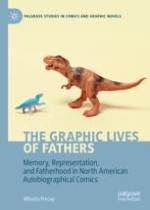2020 | OriginalPaper | Chapter
8. “When the monsters come jello them”: Fatherhood, Vulnerability, and the Magic of the Mundane in James Kochalka’s American Elf
Author : Mihaela Precup
Published in: The Graphic Lives of Fathers
Publisher: Springer International Publishing
Activate our intelligent search to find suitable subject content or patents.
Select sections of text to find matching patents with Artificial Intelligence. powered by
Select sections of text to find additional relevant content using AI-assisted search. powered by
